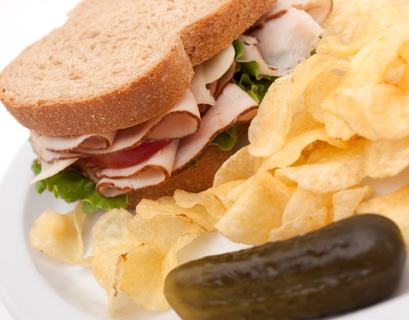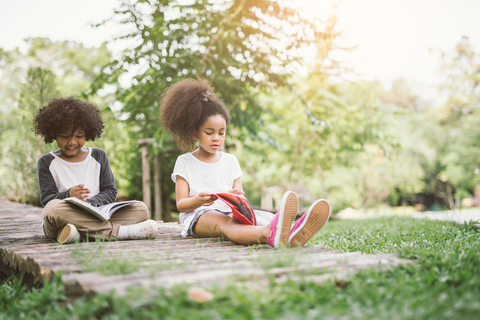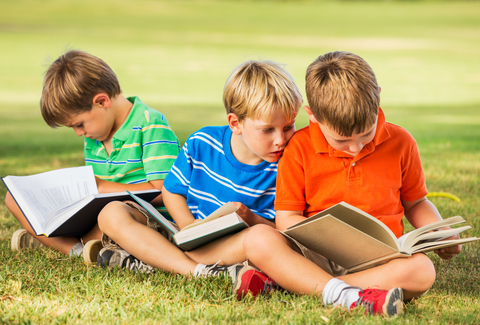
© Soleilc | Dreamstime.com
Summertime bookselling is oh, so different from the rest of the year. Parental restrictions are relaxed, and children come to the counter with piles of comics and light series books that usually would have been rationed to one per visit during the school year alongside what parents might call “real books.” The joy of free choice lights up children’s faces, and adults similarly allow themselves to indulge in less literary pursuits. I call these fun, light escape reads “potato-chip books.” They are delicious and addictive, and while they wouldn’t make up a full and balanced diet on their own, they add delightful crunch to a reading life, and almost all of us, no matter how bookish, love our snacks now and then. The variety of indulgences might vary, but most of us delight in them.
One of our staff members has two young children, one of whom is a newly independent reader. Our staffer confided that she is a little concerned with her son’s gravitation toward mass-produced superhero books and brand-name toy-related titles. We don’t carry many of these in the store, but her six-year-old son is adept at finding every single one. Now that it’s summer, she is watching families load up on Pokémon and Lego Ninjago and Superman books, and she struggles internally with wanting to let her son choose the books he’s excited about, and wanting him to discover deeper touchstone books, the kinds of books that adults remember turning them into lifelong readers.
It’s not as though her son won’t be exposed to fuller meals of books; their family reads a variety of fabulous books together on a daily basis. But she is dismayed that her son’s strongest pull is toward what seem to be the shallowest titles. After we had rung up several tourist groups’ worth of easy reading the other day, she turned to me and said, “Tell me again that potato-chip books won’t ruin kids as readers. I guess I’m looking for reassurance that my son’s literary life has a future.” Not two days later, my stepsister echoed the same concern about her two kids and the kinds of books they gravitate toward, given free rein.
What is the line, and how do we draw it?
As much as I believe in the healthy right to reading freedom for all readers, including children, I don’t subscribe to the “it doesn’t matter what he reads, as long as he’s reading” school of thought, either. It’s our happy responsibility as adults to expand the worlds of children by sharing ideas and books and experiences that they might not encounter on their own. Instead of constantly judging and monitoring their choices, though, which turns the incredible joy of reading into a chore or a power struggle, the goal is to pay attention to what kids are drawn to. For all readers, even self-proclaimed “reluctant” ones, it’s really just a matter of discovering the right book at the right time. Finding out what lights up a kid’s interests is the surest way to matching them to books they’ll love, whether they be potato-chip titles, veggie snacks, or full-on feasts.

© Saksit Kuson | Dreamstime.com
By letting kids have potato-chip books without signaling dismay and disdain, we send the message that we respect their choices. Because really, children are drawn to books for the same reasons we are: they want entertainment, or information, or an escape, or to ponder ideas. Sure, entertainment is often highest on the list for many kids, but why wouldn’t that be the case?
I’ve never known a literary adult who didn’t also, as a child, love comic books or joke books or crummy, badly-written-but-entertaining series. The more fluent readers become, the more willing they are to try harder, more complex books, and if they have reading adults around who take them to libraries (and bookstores), and read wonderful books with them, and model reading themselves, and if they attend schools that value reading time, they are in no danger of stunting their literary growth with some summertime potato chips.
And remember, some chips are made from other kinds of vegetables, too. It’s not hard to sneak some excellent writing and ideas in among the snack books.
P.S. Another staffer, Liza, shared on our Facebook page this School Library Journal opinion piece by Donalyn Miller, called, “If Kids Can’t Read What They Want in the Summer, When Can They?”

© Epicstock | Dreamstime.com

My daughter went through a phase where the ONLY thing she wanted to read were Mary Kate and Ashley (the once famous tv twins) mysteries. As a librarian I was semi-horrified, but consoled myself that the series was going out of print.
*Cue ominous music*
She found the entire set at the library used book sale and had enough money in her tiny change purse to buy every single one.
I crossed my fingers, and let her read them over and over for six months. Looking back I think they were easy and comforting at a time when her friendships were changing and difficult. It didn’t make a bit of difference in her academic success, but it certainly helped make her an avid reader.
So, hat’s off to Mary Kate and Ashley, my apologies for being a doubter:)
Reading: Better than the alternatives.
I feel this! I read with a six year old every week and she ALWAYS wants to read Pinkalicious and licensed titles. Frozen, Disney Fairies, Nick series like Sparkle & Shine or Nella the Princess Knight… she once let me read Junie B. Jones to her but I think she did it mostly because she could tell how much I wanted to.
I’ll never tell a kid their choices are dumb, and when I was a bookseller I always defended children’s choices to their parents. They would trash talk Captain Underpants or Wimpy Kid to me, thinking I was a Big Intellectual, and I would put on this very patronizing smile and say, “wouldn’t you rather them only read Captain Underpants than never read anything at all?”
In my mentee’s defense, the book selection in this reading program is… pretty dismal and outdated. So many picture books that are text-dense, with bland illustrations and barely any story. When we start up again in the fall, I want to try to start her on Bink & Gollie, even if I have to bring it from home. I would love to share Kate DiCamillo with this kid.